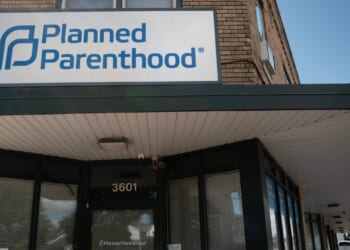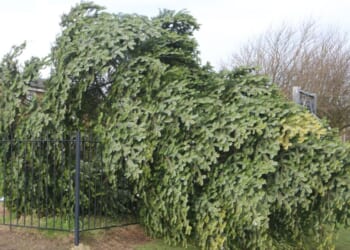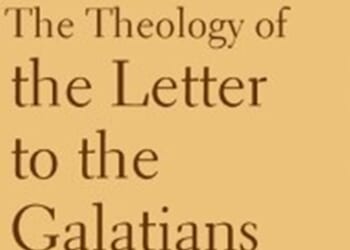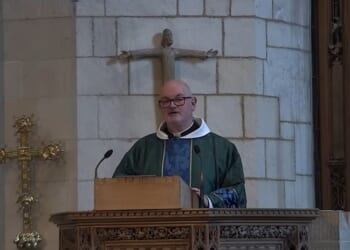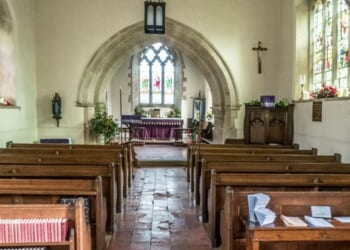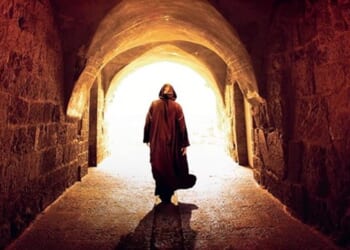From Vaughn v. Harrison County, decided Friday by Judge Taylor McNeel (S.D. Miss.):
Yesterday, Rev. John Vaughn filed this lawsuit seeking to have fifty people attend a worship service in a barn on his private property. Vaughn is proceeding pro se. He has scheduled the worship service for some time tomorrow, but he acknowledges that Harrison County has told him he cannot have the fifty people in the barn because Harrison County believes that a gathering at the property “would constitute a very serious life safety situation.”
Vaughn has filed a Motion for a Temporary Restraining Order asking this Court to order Harrison County to allow the fifty people into the barn. But he does not want Harrison County to have notice of this motion or to have the opportunity to respond. Instead, he wants this Court to enter an ex parte Order without giving Harrison County the chance to explain their position. But this is a litigation strategy created by Vaughn’s own making. Instead, Harrison County needs to be served with process, given time to respond, and then an evidentiary hearing can be set.
Vaughn’s motion is denied for a number of reasons. First, the primary purpose of a temporary restraining order is to maintain the status quo. But Vaughn is seeking to change it—not maintain it. Harrison County told him about seven months ago to not have fifty people in this barn. Vaughn could have challenged that action then.
Second, Vaughn does not establish a substantial likelihood of success on the merits. Vaughn does not really present evidence or on-point case law to support his assertions.
Third, Vaughn does not show a substantial threat of irreparable injury. Vaughn recognizes that the congregation’s primary church building is available for the worship service.
Fourth, the harm that will result if the temporary restraining order is granted potentially outweighs Vaughn’s injury. If the Court were to grant the temporary restraining order, these people could be injured while congregating at Vaughn’s barn.
And fifth, granting the temporary restraining order could disserve the public interest because it may expose fifty people to potentially dangerous and unsafe conditions.
It is true that some of his allegations—even if conclusory—are concerning. But even still, Harrison County has stated that it believes allowing fifty people inside of this barn will present a “very serious life safety situation.” Vaughn has really only presented conclusory statements in response. And he provides no concrete evidence in support. No sworn affidavit. No photographs. A court turns activist if it were to force a county to allow a gathering that the county believes is dangerous—without allowing the county the opportunity to first respond and explain. Accordingly, the Court denies the Motion for a Temporary Restraining Order and takes the Motion for a Preliminary Injunction under advisement.
For more details, read the whole opinion; here’s an excerpt discussing the factual allegations:
[O]n April 30, 2025, Harrison County issued a cease-and-desist order “regarding remodeling work on Plaintiff’s barn.” {Vaughn does not provide the Court with any information, through photo evidence or otherwise, of the state of his barn and the remodeling work which led to the cease-and-desist order.} The order was allegedly related to zoning and construction requirements. But the directive at issue, which Vaughn refers to as “Item #8,” requires Vaughn to “[c]ease operating a church and accessory structures or apply for conditional use to do so.” {Vaughn does not provide any information or context as to why the cease-and-desist order was issued, nor does he provide the entirety of the order. The only portion of the cease-and-desist order that Vaughn submitted to the Court was a seemingly partial list of required actions.}
Vaughn assures the Court of his “complete cooperation” with “Item #8’s prohibition.” Vaughn says that, since April 30, 2025, he has refrained from hosting Bible studies or worship services, conducting monthly prayer meetings, and “exercis[ing] religious practice on his own land.” And he claims that he did not “violate, or resist any legitimate zoning requirement related to construction or building safety,” despite his argument that “Item #8 is not about construction[,] … fire safety[,] … [or] building permits.”
But this changed on November 15, 2025 when he “announced during a worship service at his church that he intended to hold a Thanksgiving prayer gathering and fellowship meal on Saturday, November 22, 2025, at the property.” [Fifty people are expected to attend. Vaughn claims that “[s]omeone recorded [his] announcement and provided it to Harrison County officials.” …
Vaughn claims violations of RLUIPA, Mississippi Religious Freedom Restoration Act, and several First Amendment theories. But he provides only conclusory statements that he “has an extraordinarily strong likelihood of success” on his claims. Vaughn provides no real evidence or specific case law to support his claims. Rather, he provides only general case law and legal theories.
But even if he provided more evidence to support his claims, a person does not have a constitutional or statutory right to host fifty people in a structure that “constitute[s] a very serious life safety situation,” even if the reason for hosting is for a worship service. On the other hand, a local government cannot claim a structure “constitute[s] a very serious life safety situation”—when it does not—just to prevent people from worshiping. And obviously the First Amendment and RLUIPA trump any local ordinance, so Harrison County must be mindful that their actions do not violate federal law. But this is why Harrison County needs to respond. An evidentiary hearing is required to resolve this dispute.
And the “static deficiency in the quantum of evidence” is far from the only problem with Vaughn’s request. Samuel L. Bray, The Purpose of a Preliminary Injunction, 78 Vand. L. Rev. 809, 822 (2025). The Court is also faced with the issue of time, for “the district judge cannot be said to have the advantage of living with the case and getting to know its factual nuances.” Id. (quotations omitted). So the Court is being asked to appraise the merits when the information needed to do that is unavailable. Id. at n.87 (citing John Leubsdorf, Preliminary Injunctions: In Defense of the Merits, 76 Fordham L. Rev. 33, 41 (2007). And the “problem for the judge asked to grant a preliminary injunction7 is that he is being asked to rule in a hurry, on the basis of incomplete information. The risk of error is high.” Id. (quoting Richard A. Posner, Economic Analysis of Law § 21.4, at 522 (3d ed. 1986)). Since this motion was filed, the Court has handled four sentencings and two guilty pleas. This is in addition to the time spent out of the courtroom itself that still requires special attention given to other cases in the management of the hundreds of cases on the civil and criminal dockets….






